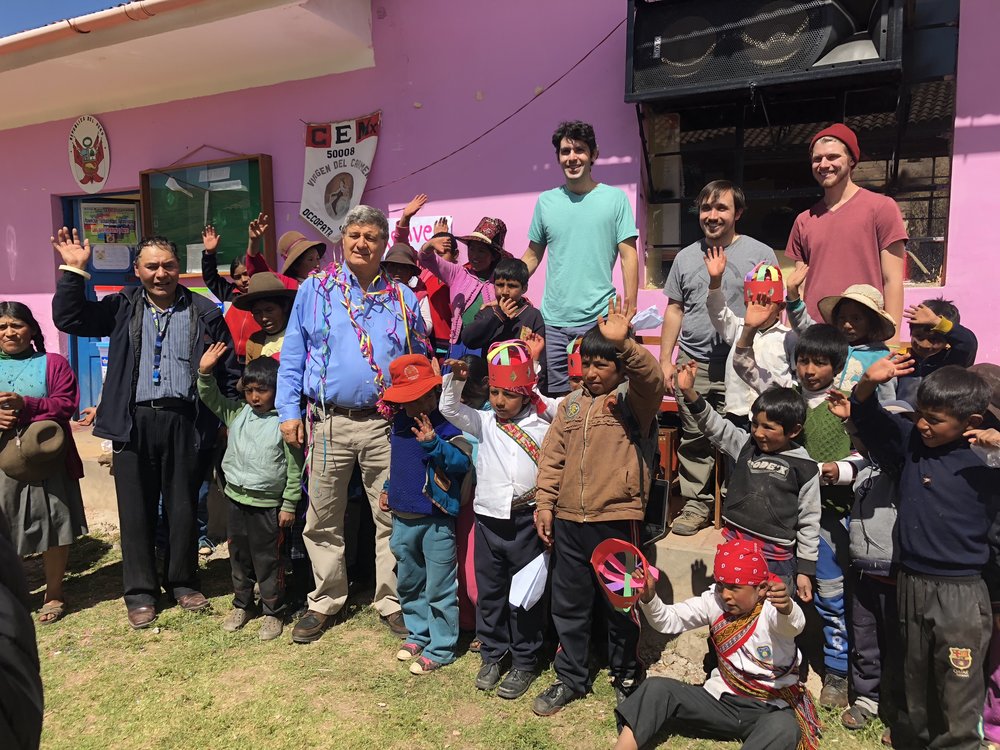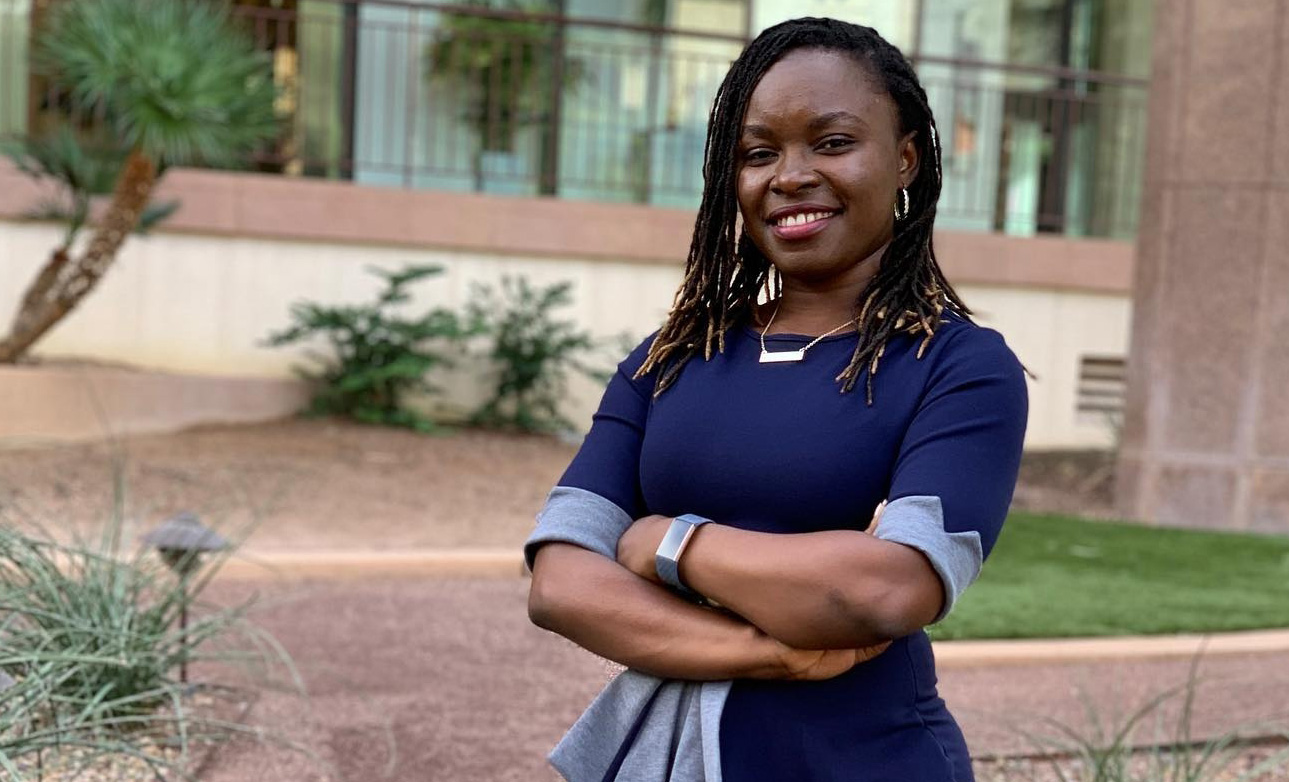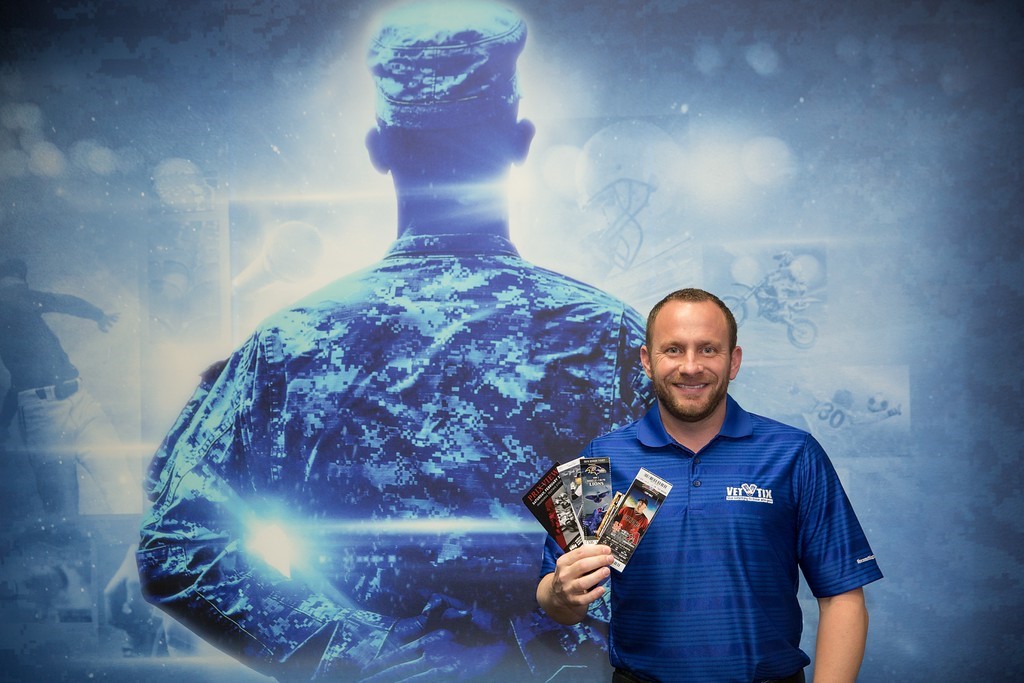ASU alumni turn passion for helping people into thriving nonprofits

Arizona State University graduates have started dozens of nonprofit organizations that help thousands of people in Arizona and around the world, including Native Americans, veterans, children with disabilities, foster kids, immigrants and people in developing countries.
Here, ASU Now profiles seven of those alumni, who for years poured enormous amounts of work, mostly unpaid, into their passion projects. In the future, we’ll feature more.
All of the founders interviewed here still do at least some work on the side besides running their nonprofits, and most work full-time jobs.
“Nonprofits are started by rich people or famous people because you have to have money or personal capital, and I didn’t have either of those,” said Julie Duty, who founded United Sound, which teaches middle and high school students with special needs to play an instrument through peer mentorship.
“That means you get to work for free for three years, 80 hours a week. You have to make up what you don’t have.”
Jessica Stago, a co-founder of Change Labs, an entrepreneurship incubator for Native American businesses, worked as a restaurant manager and consultant during the early years while she was launching the organization.
“We would get $20,000 here or $10,000 there and try to do something for the entrepreneurs, and then we would have nothing for a few months. That went on for a few years,” she said.
They learned from mistakes.
“Once, we brought a marketing professional out to the rez and three people showed up," Stago said. “The trainer was talking about websites that can do all this stuff and how social media was becoming a thing. And we realized, 'We don’t even have good access to the internet here.'
“That was the last time we brought anyone from off the rez to do training.”
Sometimes there’s heartbreak. Pauline Nalumansi, founder of the Pauline Foundation, which helps exploited women and children in Uganda, was ghosted by a donor.
“I shared my desire to sponsor girls in medical school and she said she would pay for 10 girls,” said Nalumansi, who recruited the young women and made sure they passed the entrance exams.
“Then she disappeared,” she said.
But after years of unpaid work and figuring it out, things get easier.
“I can see from the other side that at the five-year mark, everything changes,” Duty said.
“It’s really fun the first two-and-half years. The second two-and-half years is when you want to quit. You’ve run out of excitement and you’re still not making money.
“After five years, you start to understand what you didn’t know. You stop looking for help from the wrong places. You get some credibility and some name recognition.”
ASU educates nonprofit leaders: Nonprofit management and leadership, BS | Master of Nonprofit Leadership and Management | Certified Nonprofit Professional credential
Meet seven alumni who stuck out those early challenges and have turned their dream of helping others into a reality:
33 Buckets
The alumni founders: Mark Huerta earned bachelor’s and master’s degrees in biomedical engineering in 2013 and 2015 respectively, and a PhD in engineering education in 2019; Swaroon Sridhar earned a bachelor’s degree in biomedical/medical engineering in 2017; Paul Strong earned bachelor’s and master’s degrees in mechanical engineering in 2013 and 2014 respectively, and an MBA in 2018.
Co-founders Mark Huerta (back row, light blue shirt) and Paul Strong (next to Huerta) were in Peru last year to supply water-cleaning systems through their nonprofit, 33 Buckets.
What 33 Buckets does: The nonprofit partners with small, rural communities to engineer a customized plan for access to clean water. After water testing, each village receives a filter and disinfection system, plus training in how to install, operate and repair the system and record water quality. This year, 33 Buckets installed hand-washing stations in response to the pandemic.
The story: The nonprofit started as an EPICS project with a group of engineering students. The founder of a girls’ school in Bangladesh asked the EPICS program to create a way to provide clean water to the school. In 2012, the students traveled to Bangladesh to research the problem. The water-cleaning technology existed, but a lack of capital and problems at the local level prevented widespread implementation.
The students continued to work on the problem, and in 2014, they returned to complete the project.
“It was such an incredibly transformative experience that we wanted to continue the work,” Huerta said, and 33 Buckets was incorporated in 2015. That first project involved filtering out arsenic, which has the atomic number 33, and the model was created using buckets – thus, 33 Buckets.
“We developed a fair bit of knowledge and technical acumen in running the first project in Bangladesh, but we didn’t have other projects to apply it to. That was assigned to me,” Sridhar said.
They needed partners. Sridhar met two other nonprofit leaders at a social entrepreneurship conference who connected the team to communities in Peru and the Dominican Republic, where 33 Buckets completed its second and third projects.
As they continued to build the organization, the team joined Venture Devils at ASU, pitching 33 Buckets in entrepreneurship competitions. The group won $17,500 in the Pakis Social Entrepreneurship Challenge in 2016.
Then came a turning point. In December 2016, the ASU Foundation flew Huerta to Peru to film a 60-second commercial that featured the story of 33 Buckets. The ad showed him working with villagers and describing the mission and how his time at ASU had inspired him to help others.
“I don’t think any of us knew how big of a deal it would be until after the shooting,” Huerta said.
The commercial started running in movie theaters, and in January, it aired during the 2017 Super Bowl.
“The response was huge,” Huerta said. “We got a ton of credibility.
“But internally, nothing changed within the team. None of us were getting paid at the time,” Huerta said.
In 2017, Strong became the first employee of 33 Buckets, getting paid part-time, and the next year, he became the full-time executive director while he was pursuing his MBA at ASU. He worked on scaling the mission.
“Generally in the summer between the first and second year, MBA students do an internship. A lot of people go to Fortune 500 companies or Wall Street,” Strong said. “Instead, I flew to Peru and spent time building partnerships and surveying communities.
“I credit ASU a lot with giving MBA students the flexibility to pursue what we entered the MBA program for.”
Now 33 Buckets has 12 employees, three interns and a board of directors, and has completed 10 projects, serving 7,100 people.
Over the years, the team has improved the technology.
“We started at a small school-based filtration project and now we’re working with communities as a whole and leveraging infrastructure they have in place,” Huerta said. “Those projects are more complex and potentially risky.
“We started to ramp up our research and development and looking at creating automated smart disinfection systems.”
But it’s more than technology. The group also provides education to the communities it works with – a vital component during the pandemic. Earlier this year, after the pandemic shut down international travel, 33 Buckets worked with partners in Peru to construct public hand-washing stations with running water, soap and infographics showing effective handwashing techniques in villages in Peru. Families were encouraged to attend a seminar on preventing COVID-19, and received hand sanitizer, face coverings and information in their language.
It’s been successful: None of the communities that 33 Buckets has worked in have had any COVID-19 cases.
All three co-founders have full-time jobs besides being on the board of directors of the nonprofit. Strong stepped back from the executive director position and now works as associate product manager in the Office of Digital Learning in the Mary Lou Fulton Teachers College at ASU. Sridhar is a data science manager at Amazon, working on artificial intelligence solutions. Huerta, chairman of 33 Buckets, also teaches in the Fulton Schools of Engineering and co-directs the EPICS program, where students are working on improving water-cleaning technology.
“They’re working on developing sensors to continuously measure chlorine levels in water and create a feedback loop to put in the right amount of chlorine,” Huerta said.
“It’s come full circle.”
Aliento AZ
The alumna founder: Reyna Montoya earned a bachelor’s degree in political science and government, with a minor in dance, in 2012.
What Aliento AZ does: The organization provides support and resources to immigrants, including young people in the Deferred Action for Childhood Arrivals program, who are offered help with applications and connected to scholarships. Aliento AZ also provides art workshops to promote healing from trauma.
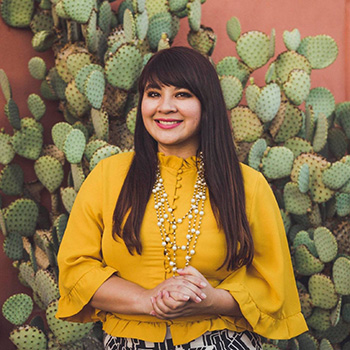
Reyna Montoya founded Aliento AZ as a way to support immigrants, particularly those who are undocumented, like herself.
The story: Montoya came to Arizona from Mexico as a child and grew up in Gilbert as an undocumented immigrant.
“Growing up undocumented meant that I had to face a lot of barriers in terms of education,” she said. For example, she couldn’t take honors math in eighth grade because of her required four-hour English-language-learning block. When she was ready to graduate from high school, she wasn’t able to apply for financial aid or scholarships.
"I did everything my teachers told me – I had a good GPA and volunteer service. But it was still the feeling of not being good enough,” she said.
Thanks to a private scholarship, she was able to attend ASU.
“I never would have been able to do it without the fortitude and tenacity of my parents, who were my biggest cheerleaders,” she said. “They didn’t graduate from high school themselves, but they really wanted me to go to college.”
At ASU, Montoya met other undocumented students like herself. She began to get involved in the immigrant rights movement during her sophomore year, in 2010, when Arizona passed a controversial anti-immigration bill.
“It was a wake-up call that I was not the only one going through these hardships and obstacles,” she said.
She was very involved in community organizations, and after graduating in 2012, worked for national and local nonprofits.
Later that year, her father was detained while awaiting deportation proceedings, a deeply traumatic time for her.
“I felt abandoned. People would sign a petition or make a call but nobody asked me, ‘How are you doing as a daughter when you don’t know what will happen with your dad?’”
“I was 23 and I thought, ‘I don’t want to be already jaded and mad at the world.'"
She joined Teach for America and taught in a school that had mostly Latino students.
“Very suddenly, I became the ‘immigrant teacher.’ Any questions about immigration, it’s ‘Go to Miss Montoya,’" she said. She connected students to attorneys and told them about scholarships.
She enjoyed found the work, but wondered what happened to students who didn’t have access to someone with her knowledge. So, working with Teach for America, she developed programming to train educators to provide support to immigrant students.
Montoya’s father was released after nine months, but the trauma lingered. She wanted to help others heal, and to support and develop leadership skills in the next generation.
“I thought, ‘I can continue to impact one student at a time or one teacher at a time, but what happens to the rest?’" she said. “So I took a took a leap of faith and decided to found Aliento AZ.”
Aliento not only works with undocumented immigrants but also allies, offering training in how to organize and create change.
“I wanted a place where a student could feel supported and we invest in them not only as an activist but as a whole person,” she said.
Montoya is excited about Aliento’s recent get-out-the-vote initiative, which made thousands of phone calls.
“Last election, only 42% of people ages 18 to 35 ended up voting,” said Montoya, who is CEO of Aliento and also works as a consultant. “It’s been empowering to see so many young people in this — many of whom are citizens but are too young to vote, and many DACA or undocumented people who don’t have the right to vote at this moment.”
Aliento’s arts and healing workshops are especially close to Montoya’s heart. After graduating, she danced professionally while continuing her advocacy work.
“Dance was my escape and the only place that allowed me to process and heal and start making sense of what it meant to miss my dad,” she said.
Aliento, which translates to “breath,” now has seven employees, eight contractors and paid fellowships for eight students.
“If you give ‘aliento’ to someone, it’s encouragement,” Montoya said.
Change Labs
The founding alumna: Jessica Stago earned a bachelor’s degree in economics in 2001.
What Change Labs does: This nonprofit supports and advocates for entrepreneurs and small business owners on the Navajo and Hopi reservations. Change Labs provides funding, coaching, technical support, help with branding and co-working spaces. A new project, Rez Rising, is a digital directory of more than 600 Native-owned businesses.
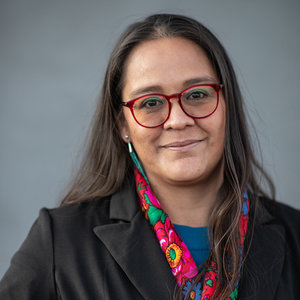
Jessica Stago, a co-founder of Change Labs, works with businesspeople on the Navajo and Hopi reservations, who often don't think of themselves as entrepreneurs.
The story: After graduating from ASU, Stago worked in the area of small business development, including with the National Center for American Indian Enterprise Development Mesa.
Then she moved back to her hometown of Winslow and decided to start a medical-supply business with her mother, focusing on the Navajo Nation, while also working in small business development for Northland Pioneer College. In that job, she connected entrepreneurs to training, technical assistance and coaching.
“That’s when I found all these entrepreneurs that nobody knew about, and when I started to figure out that our community doesn’t have the same level of support for business development as communities off the reservation,” Stago said.
She joined forces with Natasha Hale, who had started a Native incubator network. They would offer training and support for entrepreneurs, but nobody would show up because they didn’t think of themselves as entrepreneurs.
“There is not a word in our language for ‘entrepreneurship’ or even ‘business,’” Stago said. “That gives you an idea of the perception.
“When you drive through this community, you see people selling burritos or fixing cars or, what we’re most known for, people selling arts and crafts,” she said.
“You can drive down a dirt road and see a sign for anything from window tinting to tire repair to haircuts or child care. Everyone in our community has somebody they take their vehicle to to be fixed because there are no auto shops on the reservation.
“And if I say to them, ‘Do you have a business?’ they say, ‘No I just make things and people decided to pay me.’”
So they set out to change the perception, one social media post at a time.
“I started taking photos of people in their businesses. And we used the hashtag #IAmTheNavajoEconomy,” she said.
“People would repost that and they loved that their relatives were being recognized as pillars of the economy.”
Those entrepreneurs are facing a tangle of challenges.
“A business owner might have a great idea and a market to tap into, but when they get out of our program, they can’t get a loan on the reservation or a physical location,” she said.
“We need banks and investment institutions to say, ‘OK, we realize that there is this historical trauma in these communities and they’ve been wholly left out of the banking industry for generations now. To fix that, we’ll change the way we do business there and provide investment capital in ways that will work there.’”
Stago and Hale later partnered with Heather Fleming, founder of a design firm. The three co-founders based Change Labs in Tuba City, where the organization is facing one of the same obstacles as the businesses they help: access to land. Reservation land is held in trust and governed by complex laws. The nonprofit has raised enough money to build a 4,000-square-foot headquarters that would also provide space for food vendors but has been hampered by bureaucracy.
“It’s been three years of trying to get land to build a building,” she said. “We’re waiting on a right of way for a piece of land or on some kind of permit. We tried changing our plans two or three times.”
Change Labs also is working to change tribal policy to be more responsive to small businesses.
“When you have a big project like a casino, you can get those leases and all that permitting done in a couple of months, where it could take a year if you’re a small business,” she said.
Meanwhile, the nonprofit is in its fourth incubator cohort.
“All the funders want to know how many jobs we create. Well, we are working with people who can only work out of their homes. They’re not only supporting themselves, they’re supporting their entire families. There’s not an opportunity for them to hire because they can’t expand,” said Stago, who is director of business incubation for the nonprofit and also works as director of Native American economic initiatives for the Grand Canyon Trust, as well as heading her own consulting company.
“Eight years later, when people ask the jobs question, I’m proud to say that we have 27 graduates of our business incubator. They might be single-owner entrepreneurs, but that’s 27 jobs on the Navajo Nation.”
Helen’s Hope Chest
The founding alumni: Debbie Jacobus earned a bachelor’s degree in political science in 1994 and Regena Field earned a bachelor’s degree in accounting in 1978.
What Helen’s Hope Chest does: The organization helps foster children, young people who are aging out of the foster system and children who are placed with other family members. Often, foster children are removed from their homes with only the clothes on their backs. Helen’s Hope Chest provides clothing, toys, back-to-school supplies and birthday and holiday gifts. A partnership with ASU’s Bridging Success program offers support to young people who are transitioning to college and $500 to buy supplies.
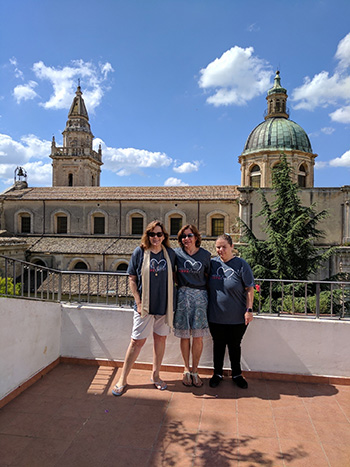
Helen's Hope Chest was based on the story of Helen Simmons, mother of Debbie Jacobus, left, and Gena Field, center, shown here with Jacobus' daughter, Jessica.
The story: Sisters Jacobus and Field were on their way home from the cemetery after their mother, Helen Simmons, died in 2009. They heard on the radio that the United Way was having difficulties helping foster families because funding had fallen during the recession.
“We decided then, as part of our mother’s legacy, that we wanted to contribute some of her estate to them,” Jacobus said.
Simmons had had a difficult life. During the Depression, when she was a year old, Helen and her 3-year-old brother, Walter, were abandoned on the steps of the New York Foundling Hospital in New York.
“We believe her father had left and her mother couldn’t take care of the kids,” Jacobus said. “So they were placed into a foster home in Queens together.
“They were never adopted, and my mother was always a bit bitter about that. There were a number of kids there and they watched the other kids be adopted.”
The experience haunted Simmons and she vowed to never abandon her own children.
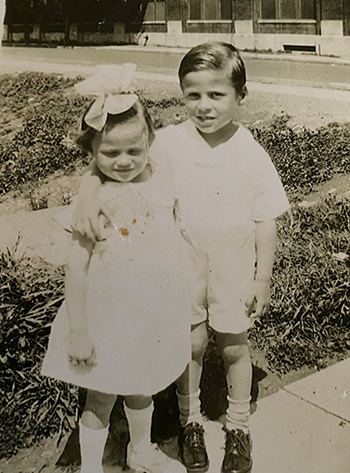
Helen Simmons and her brother, Walter, were abandoned by their mother during the Depression.
When Walter turned 18, he was let go from the foster system and joined the Marine Corps. He was killed in the Korean War a year later. Simmons married young and when Gena was 3 and Debbie was 4, their father was killed in a car accident.
“So my mother lost her parents, lost her brother and lost her husband,” Jacobus said. But she was determined to keep the family together and make her daughters feel valued. Simmons married an older man who could provide for her family and joined him in his business.
When the sisters went through their mother’s things after she died, they found a piece of paper on which she had written, “Children are the anchors that hold a mother to life.”
“We were so grateful to her, and she was the best mother ever,” Field said.
The United Way was excited to accept the donation to help foster children and asked if they could use Simmons' story to name it.
At the time, Jacobus worked in the Arizona office of Sen. John McCain, and he cut the ribbon at the opening of Helen’s Hope Chest in Mesa in 2009.
“I was so choked up I couldn’t talk at the opening,” said Jacobus, who’s now retired.
Both sisters still donate to the organization and are involved in special projects. In 2014, the charity moved to new quarters in downtown Mesa. Helen’s Hope Chest is set up like a store, where children and teenagers can pick out the clothing and supplies they like.
“These children have had it so rough and it’s great that they can go to school looking normal and not feel like an outcast,” said Field, a CPA with her own practice in Wyoming.
“I think our mother would smile knowing that Helen’s Hope Chest is part of her legacy.”
Pauline Foundation
The founding alumna: Pauline Nalumansi earned a bachelor’s degree in accountancy in 2018 and a Master of Global Affairs and Management from the Thunderbird School of Global Management at ASU in 2020.
What the Pauline Foundation does: The Pauline Foundation provides skills training and scholarships to exploited women and children in Uganda and supports rural farmers.
Pauline Nalumansi founded the Pauline Foundation to provide business skills to exploited women and children in Uganda, her home country.
The story: Nalumansi grew up in Uganda and had a difficult childhood, losing both parents before the age of 12 and being forced to work as a housemaid. She won a scholarship to high school and, when she was 24, won a Mastercard Foundation scholarship to come to ASU. It was the first time she left her country, and the first few months were very hard as she struggled to fit in.
“My English wasn’t that good so I struggled to understand the American accent,” she said. “The food was a challenge. I didn’t know how to cross the road. I missed my family so much and I was lonely most of the time.
“I was crying most of the nights.”
But after bonding with a counselor at Camp Carey, Nalumansi began challenging herself to socialize and seek out opportunities. She became a mentor for the Fleischman Scholars program and a math tutor, and she began to share her story with other people.
She submitted 200 applications for student jobs but was unsuccessful. So she got help from the W. P. Carey School of Business in polishing her resume and practicing interviewing skills, and then landed two jobs – as a program manager with the International Students and Scholars Center and in the career services center of Global Launch.
While she was an undergraduate, the anxiety over her future became overwhelming, and she became depressed.
“Every evening, I would go to A Mountain and pretend that I was hiking but I was talking to God. ‘Did you bring me to this country to suffer?’ I asked."
As she prayed, Nalumansi began to get the idea for a foundation that could help people. But she didn’t know where to start. She went to Changemaker Central, pitched her idea for the Pauline Foundation to a room full of people for the first time and won $2,500 in the Changemaker Challenge social entrepreneurship competition.
At the same time, she was contemplating her future. She knew that even with a bachelor’s degree, she would have trouble finding a job back in Uganda. Then she heard about the Thunderbird School of Global Management.
“I was applying for funds for the Pauline Foundation at the same time I was applying for scholarships for Thunderbird at the same time I had two jobs and was a full-time student,” she said.
She was selected for a SHARE Fellowship to attend Thunderbird, and believes she won because she described her dream for the Pauline Foundation in her essay.
The summer after graduating with her bachelor’s degree and before starting at Thunderbird, Nalumansi returned to visit Uganda. Originally, she wanted to raise money to pay school fees for young girls who are forced to drop out of school to work to support their families.
“When I went home and talked to these girls, I realized that most were abused sexually in the process of selling food on the roadside,” she said. “They were not interested in school, but they did want to start their own businesses. But they didn’t have the skills.”
Some girls drop out of school when they are hired by families to care for young children, and sometimes they are sexually abused by men in the household.
So Nalumansi pivoted in her mission, deciding that the Pauline Foundation would offer courses in tailoring, baking and hairdressing to those young women, and start a day-care center so families would have an alternative to hiring school-age girls. Since its founding in 2017, the foundation has awarded 22 scholarships and trained 44 young women.
Nalumansi graduated from Thunderbird in May and is spending this year as a University Innovation Fellow at ASU. Fellows are free to create their own projects, and she is working on ways to support foster children as well as seeking partners to expand ASU Prep Digital globally.
Her goal is to create a new kind of higher education system in Africa, and she’s planning to pursue a PhD next year.
Unable to travel during the pandemic, Nalumansi misses the young women she’s connected with in Uganda, but the foundation has continued to help. Recently, it launched computer training programs in remote areas.
“The students send me messages – ‘I never thought I would touch a computer,’” she said.
“That makes me want to keep doing more.’ ”
United Sound
The founding alumna: Julie Duty graduated with a bachelor’s degree in music education in 1998.
What United Sound does: The nonprofit teaches students with special needs to how play an instrument. The United Sound model involves providing training to the teachers as well as coaching students in band and orchestra on how to support their peers with disabilities.
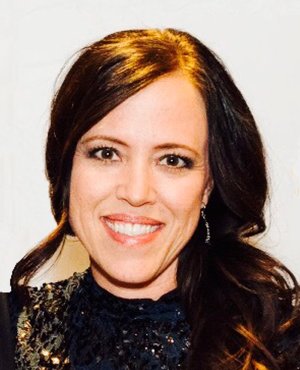
Julie Duty, a former band teacher, founded United Sound as a way to provide support so special education students could join band and orchestra.
The story: After graduating from ASU, Duty worked as a band director for nine years.
“While I was teaching, I really wanted my classroom to be open to everyone,” she said. Her principal took her seriously and sent three special education students who had autism to her band room of 92 seventh-graders.
“I didn’t have any training,” she said. Music education students typically are not taught about special education, and vice versa.
In 2006, she stopped teaching to become a stay-at-home parent, and during that time she began to think about ways to help music teachers welcome special-education students into their bands and orchestras. The idea went on the back burner until a few years later, when she began volunteering at the Sunshine Acres Children’s Home, a Christian residential center for children who are separated from their parents. There, Duty learned how to write grant requests and plan board meetings.
In 2013, she enlisted a friend who taught music at Desert Vista High School to run a pilot program in which every special education student who participated played every instrument.
“When you have a child with a disability in your class, we tend to hand them a drum. Maybe there’s a reason we don’t hand out trumpets? There isn’t,” she said. “But we wanted to make sure.”
Since then, United Sound has expanded to 129 schools in 29 states, and more than 8,000 students have participated.
United Sound pairs a special education student, called a new musician, with three mentors, who are typical kids in the band or orchestra class.
“So 75% of the people we service are regular band and orchestra kids and we’re teaching them to be quality mentors, which will change them for the rest of their lives,” she said.
One mother told her, “I don’t know if you understand what a big deal this is because those are the people who will decide whether my son and people like my son are employable.”
The organization also provides training to music and special education teachers, who teach the student mentors.
“So the music teacher can be in charge of the music and the special education teacher doesn’t need to learn how to play the violin,” Duty said.
“When I had a room with 90 kids and three new musicians, there was a capacity problem. I couldn’t replicate myself but if I can teach a student how to do it, there are a lot more hands on deck,” she said.
Some of the nine United Sound college chapters were formed by students who participated in high school, she said.
“We’re dropping a pebble in the middle of a lake,” she said. “We want to keep doing this until we don’t have a job any more and they know how to include every child.”
Duty wishes that there was more cross-training between music education and special education students.
“Special education training for music education happens in the general education department and you go and sit in a classroom and they say, “This is autism and think about how this applies to your area,’” she said.
“Well, I don’t know how that applies to a violin.”
When the pandemic hit, United Sound pivoted, offering play-along videos for students at home, weekly Zoom virtual drum circles and distance-learning resources for parents.
Duty said the main goal of United Sound is to promote social inclusion through music. She’s seen special education students in the program make huge strides, including one young man who went from not speaking to performing in the Tournament of Roses parade with his peers.
“He ended up graduating early and getting a job in the school district,” she said.
“When you have the opportunity to help somebody, you gain so much insight about yourself.”
Vet Tix
The founding alum: Michael Focareto III earned a bachelor’s degree in computer information systems in 1998 and a master’s degree in information management in 2009.
What Vet Tix does: The nationwide organization provides donated event tickets to current military members, veterans and their families and families of those killed in action. Recipients pay only a delivery fee of $14.97. Veterans who want to participate are verified and can enter a Vet Tix lottery for available tickets.
Michael Focareto III founded Vet Tix as a way to say "thank you" to fellow veterans.
The story: In 2008, Focareto was going through some personal changes and began taking self-improvement courses. One of his assignments was to create something that would help his community and involve others.
Around the same time, Focareto attended the Super Bowl in 2008 in Glendale with a friend and noticed empty seats.
“I looked at him and said, ‘Maybe I should take this thing to the next level and create a nonprofit.’ And it turned into something huge.”
Since its founding in 2008, Vet Tix has given military veterans more than 9.5 million tickets to every kind of sporting event, as well as concerts, comedy shows, movies, Renaissance festivals, the Barrett-Jackson car auction, ballet performances, recreational experiences like paddle boarding and venues such as zoos, botanical gardens, haunted houses and museums.
“Being a vet myself, I wanted to say thank you,” said Focareto, who is a Navy veteran, having served in the first Gulf War as a naval nuclear engineer on the USS Virginia. He attended ASU after he left the Navy.
Receiving free tickets to an event is not only a help for families who might be having financial difficulties, it’s also a bonding experience and a way for struggling vets to integrate into society, even for a day.
When he was first launching Vet Tix, Focareto had to overcome skepticism from his fellow veterans.
“Every military member thinks everything is a scam,” he said. “They’re very cynical.”
And Vet Tix had to prove that veterans who received tickets would actually show up to events so donors could see that the seats were filled.
“That’s a big deal for organizations and now we’ve integrated our software with Major League Baseball, Ticketmaster, Live Nation and colleges,” he said. “Teams and season ticket-holders can donate.”
Vet Tix has been able to see its impact because every recipient is invited to write a “thank you” to the donor. The site now includes nearly 600,000 testimonials, including photos of families holding “thank you” signs.
“If you start to read through them, you see people saying, ‘I was down on my luck and I was able to go to this event with my family and it gave me a renewed reason to live,’” Focareto said.
“One 65-year-old veteran went to a Nashville Predators game and wrote, ‘That was the last time I saw my son alive because he died of a heart attack the next day.’
“If you think about it, it’s a moment in time and what that moment in time can mean to people is surreal.”
Focareto is proud that the organization spends 95% of every dollar taken in on tickets and only 5% on administration. The organization is now one of the Sun Devil 100, a group of successful businesses and organizations started or run by ASU alumni.
Besides coordinating the donation of tickets from teams, leagues, promoters, organizations, venues and individuals, Vet Tix also buys tickets, and is now its own fifth-largest donor.
The organization has also expanded to include First Tix, which gives away tickets to first responders – firefighters, emergency medical technicians, police officers and nurses.
Vet Tix started in Focareto’s garage and now is headquartered on Rio Salado Parkway in Tempe. The pandemic has hit the group hard, and half of the 20 employees were let go.
“We lost 99% of our revenue,” said Focareto, who, besides being founder and CEO of Vet Tix, also works full time as a senior engineer for a software company.
“But things are starting to open up a little bit. And we’ve been able to do a lot of development and cleaning up of our data,” he said.
“We have a great reputation and lot of momentum behind us.”
Top image of Old Main by Deanna Dent/ASU Now


